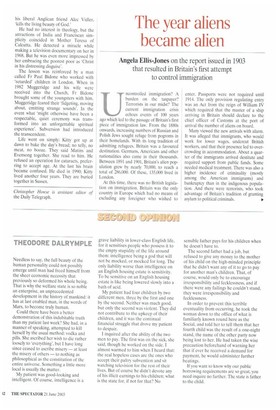THEODORE DALRYMPLE
Needless to say, the full beauty of the human personality could not possibly emerge until man had freed himself from the sheer economic necessity that previously so deformed his whole being. That is why the welfare state is so noble an enterprise, an unprecedented development in the history of mankind: it has at last enabled man, in the words of Marx, to become truly human.
Could there have been a better demonstration of this indubitable truth than my patient last week? She had, in a manner of speaking, attempted to kill herself by the usual method: vodka and pills. She ascribed her wish to die rather loosely to 'everything', but I have long since ceased to ascribe misery — at least the misery of others — to nothing as philosophical as the constitution of the entire universe. Something a little more local is usually the matter.
My patient was good-looking and intelligent. Of course, intelligence is a grave liability in lower-class English life, for it sensitises people who possess it to the empty stupidity of the life around them: intelligence being a god that will not be mocked, or mocked for long. The only liability worse than intelligence on an English housing estate is sensitivity. To be sensitive on an English housing estate is like being lowered slowly into a bath of acid.
My patient had four children by two different men, three by the first and one by the second. Neither was much good, but only the second was violent. They did not contribute to the upkeep of their children, and it was the continual financial struggle that drove my patient to despair.
I inquired after the ability of the two men to pay. The first was on the sick, she said, though he worked on the side. I almost warmed to him when I heard that: the real hopeless cases are the ones who accept their paltry subvention and sit watching television for the rest of their lives. But of course he didn't devote any of his illicit earnings to his children: what is the state for, if not for that? No sensible father pays for his children when he doesn't have to.
The second father had a job, but refused to give any money to the mother of his child on the high-minded principle that he didn't want any of it to go to pay for another man's children. That, of course, would only be to encourage irresponsibility and fecklessness, and if there were any failings he couldn't stand, they were irresponsibility and fecklessness.
In order to prevent this terrible eventuality from occurring, he took the woman down to the office of what is familiarly known round here as the Social, and told her to tell them that her fourth child was the result of a one-night stand, the name of the other party now being lost to her. He had taken the wise precaution beforehand of warning her that if ever he received a demand for payment, he would administer further beatings.
If you want to know why our public borrowing requirements are so great, you need inquire no further. The state is father to the child.


































































































 Previous page
Previous page